Our Spiciest Year, or How We Accidentally Became Theatre Critics

When you ask us where we’re from, we won’t give you the name of a town or a city or a country. We’re from the Internet. But not this part of the Internet, which we affectionately dub the theatre-Internet. The theatre-Internet is a relatively small place, with its bright spots—HowlRound, TDF, 2amt—and its dark spots—All That Chat, anyone? But it’s not hard to get the lay of the land. And this small corner has a distinctly tamer status quo than most of the World Wide Web.
We’re Todd Brian Backus and Ben Ferber, two Internet theatre artists. We’re both director-playwrights, and with Nora Sørena Casey, we run a company called PowerOut. Todd’s also a new play dramaturg and a graphic designer. Ben’s also a published Pinter scholar and a sound/projection designer. We’ve got street cred, yo!
A little over a year ago, we were feeling stifled by theatre media. Ben was getting tired of reading theatre reviews. He felt most reviews could be boiled down to a long, but unhelpful plot summary with one or two biased, gossipy sentences about the quality of the play. Moreover, it was written by elite types, whose writing gives off the vibe that they genuinely hate working in theatre. (If you do want some hot gossip, we heard a prominent critic was relegated to the theatre section of his publication as punishment for having a drinking problem when he’d worked in political reporting.)
On the other hand, Todd felt classics, particularly Shakespeare, were being held up on a pedestal with little sense of humor and overactive reverence—a type of reverence that deadens a lively art. For example, Shakespeare productions that hit all the marks, but have none of the soul. In short, theatre criticism frustrated us and we decided to do something about it. Ben had long wanted to do a Hot Pepper Gaming offshoot, but for theatre. Todd had long wanted to do a Drunk History offshoot, but for Shakespeare. Ben had some microphones and Todd had a camera. It seemed obvious in retrospect. And thus, Hot Pepper Theater was born.
We decided to make a format, grounded in a few simple rules:
1. Eat a really, really spicy pepper or down an equally spicy shot of hot sauce.
2. Either:
a. Give a critical analysis on a theatrical production in New York,
b. SparkNotes a classic script, or
c. Promote an upcoming production.
3. Rate the show (if reviewing), and the pepper (no matter what), on a scale of 1 to 5. Only then have you earned:
4. The right to drink milk to relieve the searing pain.
We know what you’re thinking. We are super stupid. You are super right. Eating hot peppers doesn’t cause permanent damage! The pain you feel from spice is an illusion caused by capsaicin bonding to your taste receptors. You can get a bit of indigestion. And it’s about as painful the second time around—thus our Twitter handle @butthurtreviews.
We love this format for two reasons. It’s silly and fun. Secondly, when you’ve got spice in your mouth, you’re succinct. You also don’t mince words—if you don’t like something, you say you don’t like it. If you love something, you say you love it.
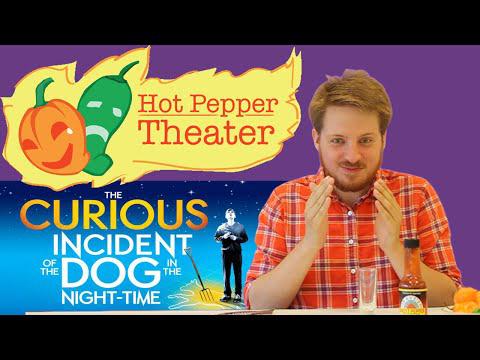
Photo courtesy of Ben Ferber and Todd Brian Backus.
We love this format for two reasons: It’s silly and fun. Secondly, when you’ve got spice in your mouth, you’re succinct. You hit your points with as few words as possible, trying to be clear and quick, so that you can vault over the finish line and get milk. You also don’t mince words—if you don’t like something, you say you don’t like it. If you love something, you say you love it. And you give a quick, simple reason why.
The Danger of Honesty and Substance
We should feed directors habaneros. It’d save a lot of rehearsal time. We tread a thin line between silly and serious, and we’ve found audiences and guest reviewers that are game to go on the journey with us. We’re weird people with a distinctly Internet sense of humor. That’s why we have fun making our reviews—we make a lot of jokes, and we edit in visual gags at breakneck speed—but we’re also giving short, smart, honest criticism.
We’ve put together a cadre of frequent guests who share our sensibilities. While our inspiration, Hot Pepper Gaming, uses a different reviewer for each episode, we thrive on regulars. Unlike the gaming community, the theatre community is much smaller and people are often apt to refuse our invite to review for one of two reasons. One in three people we ask refuses because of the spice factor, which we respect and understand. Another one of those three gives us a version of: “I’d love to come on your show, but I don’t want to go on record talking about other artists! I don’t want to get blacklisted. Can I omit the parts I didn’t like?” We understand their position, but it hurts us inside; so, we tell them, “Thanks, but no thanks.” We learned that the biggest danger of entering into the wider-Internet humor is that theatre-Internet is a small, incestuous place. It can sometimes feel overwhelmingly enthusiastic, particularly towards the celebrity/Broadway establishment.
Theatre reviews that are both honest and substantive are few and far between, and when they do peek their heads above the clouds, they come off to many theatre lovers as mean, even if that’s not the intent. The community sometimes treats actual critique as if it’s made by heartless leeches looking to destroy the form completely. Good analysis is rarely entirely positive, yet expresses negativity in a respectful manner. There is a grey area between malicious iconoclasts who attempt to cut down anything that has a modicum of success or promise, and rabid fans who defend their beloved shows to the grave. Case in point, some members of the press complain that Hamilton is talked about too much. This ironically increases the media coverage of Hamilton—a sort of Streisand Effect—and often these articles hold Hamilton to a much higher standard than their authors would apply to other shows, while also attempting to state Hamilton isn’t worth our time.
We’re the only people in theatre who make things like this. Even our more serious videos employ a mixture of irreverence and honesty that we haven’t found elsewhere in theatre criticism. Other fields have filled this gap, including amateur movie and game critics on YouTube like Angry Video Game Nerd and Red Letter Media who criticize media from much larger industries with inversely proportional stakes. When these critics speak their minds about a movie, they don’t have to worry about the producers hearing their opinion, and even more, doing anything malicious to them if they don’t like it. Both AVGN and RLM are artist-centric operations, and both shows have spun off into cinematic endeavors without worry. Conversely, both theatre audiences and the community are tiny. Thus the refrain: “I’d speak my mind, but I don’t want to get blacklisted.” That’s the worst. Even worse than the time Todd puked on camera—something he was legitimately worried about publishing for fear it would affect future hiring.
It seems like when you want to speak your mind on the theatre-Internet and remain well liked, anonymity is the way to go. That’s hard for our guests and us—our faces are attached! But people like @EmrgingDirekter, @EmrgingPlayrite, and until recently, @BroadwayGirlNYC and @Actor_Friend have used anonymity to say whatever they want on Twitter—be it poking fun at specific artists or companies, or championing real causes. Case in point, Emerging Direkter’s persistent jokes about residencies, which might take a regular emerging director out of the running for consideration.
An actor actively auditioning would never pull a stunt like @Actor_Friend’s #dim4joan and #dim4kyle campaigns urging Broadway theatres to dim their lights for Joan Rivers and Kyle Jean-Baptiste. Either would be unwise to post under a real name, lest the poster garner the ire of Broadway producers and get blacklisted by Broadway. Andrew Briedis, who recently revealed he was behind @Actor_Friend, was not only anonymous, but was no longer an active member of the theater community—having nothing to fear if his identity were revealed. Although loudly stated opinions like these are popular, warranted, and benevolent in nature, they are often critcized by the theatre-Internet. For example, playwright Leah Nanako Winkler was attacked as an artist after the NYGASP Mikado incident. We should totally ask Leah to jump on our show because she’s not afraid to speak her mind. (What up, Leah!)
Ready for Our Closeup
At this writing, our seventy-three videos have garnered 12,000 views; 128 YouTube subscribers; and almost 500 combined Twitter and Facebook followers. Our reviews of big buzzy shows usually do pretty well in the views department, and so do our classics. Our reviews of smaller shows sometimes don’t get as much play. But through all this, a few strange things happened: We had a late night show at 54-freaking Below.
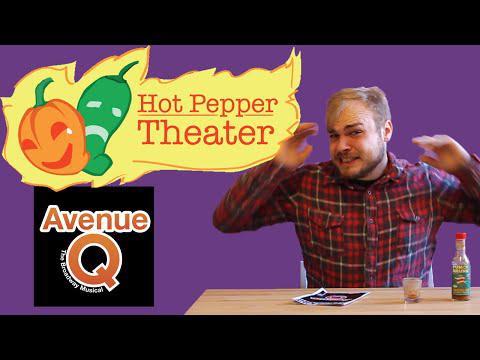
Photo courtesy of Ben Ferber and Todd Brian Backus.
David Levy, a noted friend of the show and frequent guest, joined a chat we were having on Twitter about how hilarious it would be to have singers perform after eating a hot pepper. (Credit where credit is due: Evan Maltby helped make this conversation.) David, who produces Sondheimas, thought it would make a hilarious cabaret night at 54 Below. We laughed it off thinking, “That’s never going to happen, who would ever take this joke on Twitter seriously.” A few hours later, David emailed us confirming he had not only pitched the show, but it also had been approved. Three months later, we convinced eight performers to sing songs, dance, and act while eating some of the spiciest things we’ve had on the show in front of a live audience at 54 Below. In the show, performers ate peppers and were instructed to get as far as they could before giving up and getting milk. As a testament to the show-must-go-on attitude engendered in actors, everyone finished their act completely. It was impressive. We’re stoked to do more. And that’s not even the weirdest milestone we’ve achieved.
We’re press now. We send out releases occasionally to get press to invite us to shows. When our show started, we’d get zero response to these kinds of requests and would just purchase our own tickets. Now, half the time we get the press comps we request, and more and productions we haven’t even heard of are soliciting us. If we originally couldn’t buy our own tickets, we’d have been unable to be members of the press, which is an unfortunate and, perhaps, a classist point of entry to theatre criticism. (And we can’t begin to imagine what more hurdles there would’ve been if we weren’t white dudes.) But now that we’re in, we’re in.
Recently we got press comps to review Deaf West’s Spring Awakening on Broadway. Todd went with his friend, a d/Deaf theatre artist. And in discussing the show with other d/Deaf audience members, Todd noticed something incredibly important: the show, though stunning, was not accessible to d/Deaf audiences. With the dim lighting and the speed of the music, a lot of the signing was completely unintelligible and failed to properly convey double meanings, which takes extra signing to do. Interestingly enough, The Guardian sent five people, four of whom are deaf and one who is an interpreter, to see Deaf West's Spring Awakening and they raise a lot of the points we raised in our critique of the Sim-Com problem evident in the production. Todd’s friend had intended to review the show for us, but like many guests, he was afraid his negative opinions would get him blacklisted, particularly from the d/Deaf theatre community. So Todd took his notes and recorded the episode himself.
We all want theatre criticism to be both respectful and honest. But this drive for positivity frequently translates into fear that any critique is inherently disrespectful. It stifles our collective ability to speak honestly about the successes and failures of a production. It prevents critics from saying anything other than simple plot summary without getting significant backlash. Maybe we’re not fully there yet as a field. And that’s why we crazy pepper people are so enthusiastic about shaking up theatre criticism. Are we personally there either? No. Since becoming critics, we’ve learned that we face a lot of the same problems other critics face. We strive to be succinct, to be fearless, and to convey our genuine love for theatre even if we didn’t like a show. We don’t always get all three, but we’re trying.
We’re reasonably sure The New York Times won’t make Ben Brantley eat a ghost pepper any time soon. And we’re guessing we won’t see all-emoji reviews on The Huffington Post. But as more alternative critics enter the scene, things are slowly shifting towards a more respectful, deeper, and more fun critical field.

Photo courtesy of Ben Ferber and Todd Brian Backus.
We’re reasonably sure The New York Times won’t make Ben Brantley eat a ghost pepper any time soon. And we’re guessing we won’t see all-emoji reviews on The Huffington Post. But as more alternative critics enter the scene, things are slowly shifting towards a more respectful, deeper, and more fun critical field. ShowScore is perhaps a herald of this change. It’s basically the Rotten Tomatoes of theatre. They aggregate and weigh reviews from The Times and other certified publications, and even indie bloggers and audience members. They cover shows from Broadway to Off-off-off-ad infinitum. For a while you could see recommendations for Hamilton alongside Kapow-i GoGo, which we think is awesome. It’s a more populist approach to criticism, and sways the balance away from the almighty Times. It allows its readers to find the one or two relevant sentences in each review that’ll tell them something substantial about a show’s impact. And it opens the field for people like us with a mission to get our voices, however small, heard alongside the louder ones.
We came into the theatre critic game because we had a lot of issues with the way criticism worked. And doing it has shown us pressures and pitfalls we couldn’t have imagined. It certainly feels like the walls are falling around us and with some hard work, diligent honesty, and a sense of humor, theatre can become more open to conversation. Meanwhile, we’ll be over here eating peppers. They taste even better this year.



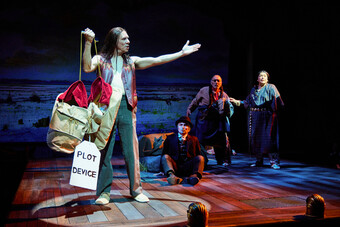

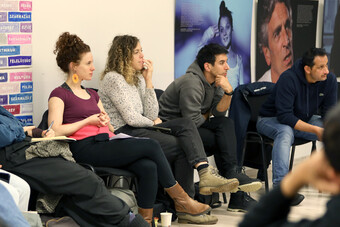


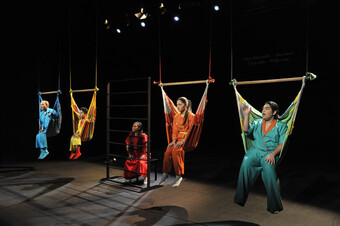


Comments
The article is just the start of the conversation—we want to know what you think about this subject, too! HowlRound is a space for knowledge-sharing, and we welcome spirited, thoughtful, and on-topic dialogue. Find our full comments policy here
After reading this post I learned a unique way of criticism. Now a days, there is all hate and not enough even ground, or positivity which totally sucks because sometimes some shows are just not for some people... so when they write a terrible review it effects everyone around them. So with this whole.. "finding the spiciest food and eat it then write your review" it gives that person time to fully critique the piece with well thought out sentences so they can drink the milk or cool down their mouths. Also, I have never really thought/ knew that you could get completely blacklisted from a company if you state what you believe about how the performance was. In life, for things to get better you need to understand criticism and what its all about, so if people have a chance to speak their minds and can't because of the fear of getting blacklisted is a scary thought. To conclude I think that the whole eating peppers is a cute and clever way to have fun but to also state your full and honest truth in a few simple words! Keep up the good work and keep coming up with new ideas! I will definitely stay tuned by following your youtube!!